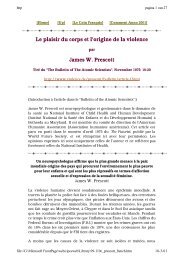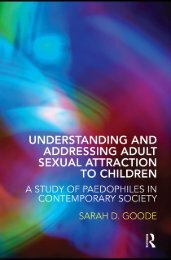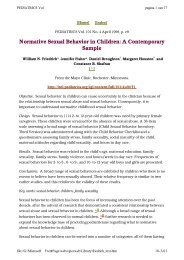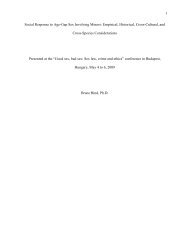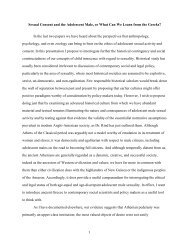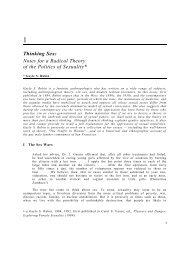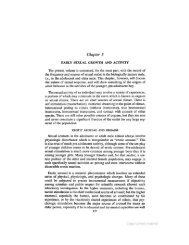Infant and Child Sexuality: A Sociological Perspective - Ipce
Infant and Child Sexuality: A Sociological Perspective - Ipce
Infant and Child Sexuality: A Sociological Perspective - Ipce
Create successful ePaper yourself
Turn your PDF publications into a flip-book with our unique Google optimized e-Paper software.
The general taboo on sensory-affectional relations between child<br />
<strong>and</strong> parent greatly minimizes the amount of intimacy learning that the<br />
child receives in the home. And although there is limited evidence that<br />
some change is taking place in the direction of more sensory-affectional<br />
contact in the home, it is too early to speculate on the effects<br />
of such change.<br />
Another aspect of child-parental sexual encounters manifests itself<br />
when the parent observes the sexual encounters between a child <strong>and</strong><br />
a peer. Prevailing adult attitudes filter through to the child in the<br />
way the parent h<strong>and</strong>les the situation, as well as through other parental<br />
reactions to sexual activity. In sexual situations parental reactions<br />
in the United States are commonly unambiguous if the parents’<br />
responses are negative. And unfortunately, unlike other negative injunctions,<br />
the ones referring to sexual behavior are seldom retracted,<br />
even at much later dates or as applying to very different sensory-affectional<br />
situations.<br />
The phenomenon of non-labeling or mislabeling the sex organs <strong>and</strong><br />
their functions, practiced by many parents, also inhibits true communication<br />
between child <strong>and</strong> parent in the area of sexuality. Thus, the<br />
child’s sex questions are few <strong>and</strong> usually poorly answered.<br />
Adults other than parents can also be involved in sexual encounters<br />
with children. Their roles vary from mild verbal references to sex<br />
or sex matters to violent <strong>and</strong> aggressive child molestation. The unwritten<br />
rule that discipline of a child is the responsibility of the<br />
child’s own parents often keeps other adults from extreme interference<br />
in the sexual socialization of another parent’s child--even when the<br />
adult views that child in what he may believe to be an improper sex<br />
act. Sexual-erotic activity that involves adults <strong>and</strong> children is generally<br />
condemned in the United States. Exhibitionism, incest, <strong>and</strong> pedophilia<br />
are especially proscribed.<br />
The results of <strong>and</strong> responses to sensory-affectional encounters in<br />
early childhood vary with the individual. However, such encounters are<br />
becoming more <strong>and</strong> more accepted as part of the normal maturational process,<br />
something with which children can adequately deal <strong>and</strong> from which<br />
they suffer no lasting ill effects. Yet young people today generally<br />
recall their childhood sensory-affectional encounters, including their<br />
sex education, as having been almost totally inadequate in preparing<br />
them for experiences with the opposite sex during adolescence <strong>and</strong><br />
adulthood. The elements of secrecy, repression, anxiety, <strong>and</strong> isolated<br />
negative encounters with adults create socio-sexual attitudes as do the<br />
more positive experiences. And whatever pattern of sexual life is developed<br />
early in childhood, it is regulative <strong>and</strong> difficult to change in<br />
later life. The roots of sexual behavior are established early in life<br />
<strong>and</strong> intimate associations <strong>and</strong> attachments at all ages in infancy <strong>and</strong><br />
childhood are necessary to sensory, affectional, <strong>and</strong> sexual maturity.<br />
74



